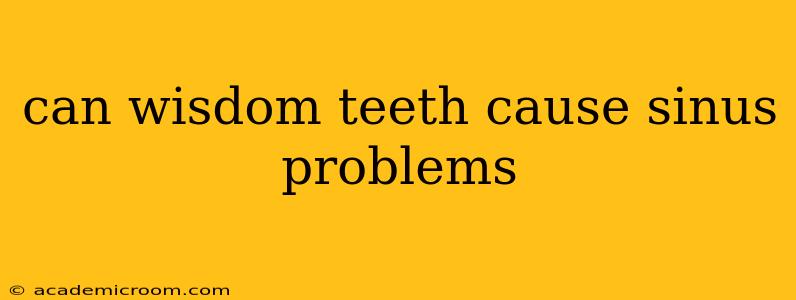The question of whether wisdom teeth can cause sinus problems is a complex one, often debated among dental and medical professionals. While not a direct, causal relationship in all cases, there's a significant anatomical connection that can lead to complications. This article will explore the potential link, addressing common questions and concerns.
How Close Are Wisdom Teeth to the Sinuses?
The proximity of wisdom teeth (third molars) to the maxillary sinuses – the air-filled cavities located in the cheekbones – is the crux of the issue. These sinuses are relatively close to the roots of the upper wisdom teeth. The thin bone separating them varies in thickness between individuals. In some people, the roots of the upper wisdom teeth might even extend into the sinus cavity.
Can Impacted Wisdom Teeth Cause Sinus Infections?
While not a guaranteed outcome, impacted wisdom teeth (those that don't fully erupt) can indeed contribute to sinus problems. Here's how:
- Infection: Partially erupted or impacted wisdom teeth can create a haven for bacteria. This bacterial buildup can potentially spread to the sinuses, leading to sinusitis (a sinus infection). The proximity means infection can easily traverse the bone.
- Inflammation: Even without infection, the presence of an impacted wisdom tooth can cause local inflammation. This inflammation can extend to the surrounding tissues, potentially affecting the sinus lining and contributing to sinus pain and pressure.
- Sinus Blockage: In rare cases, the presence of a wisdom tooth, especially if it's impacted or only partially erupted, might physically obstruct the sinus openings, leading to drainage issues and an increased risk of infection.
Can Wisdom Tooth Removal Help with Sinus Problems?
In cases where sinus issues are directly linked to wisdom teeth, removal can often alleviate the problems. If the tooth is infected, removal eliminates the source of infection, preventing further spread to the sinuses. Furthermore, removing a wisdom tooth that's causing inflammation or blockage can resolve the related sinus symptoms.
However, it's crucial to understand that not all sinus problems are caused by wisdom teeth. Many other factors can contribute to sinusitis, such as allergies, colds, and nasal polyps. A doctor or dentist needs to perform a thorough examination to determine the underlying cause of your sinus issues.
What are the Symptoms of Wisdom Tooth-Related Sinus Problems?
Symptoms might overlap with typical sinusitis symptoms, making diagnosis crucial. These symptoms include:
- Facial pain and pressure: Pain might be localized around the wisdom tooth area and radiate towards the sinuses.
- Headache: Sinus headaches are common and often feel different from tension headaches.
- Facial swelling: Swelling in the cheek area near the wisdom tooth could indicate infection.
- Nasal congestion: Difficulty breathing through the nose.
- Postnasal drip: Excess mucus dripping down the back of the throat.
- Fever: A sign of infection.
How is Wisdom Tooth-Related Sinus Problems Diagnosed?
Diagnosis involves a combination of:
- Physical examination: A dental and/or medical professional will examine your mouth and sinuses.
- X-rays: Dental x-rays are crucial to visualize the wisdom teeth and their relationship to the sinuses. A CT scan might provide a more detailed view.
- Medical history: A comprehensive medical history helps determine other potential causes of sinus problems.
Can Wisdom Teeth Cause Sinus Pressure?
Yes, wisdom teeth can certainly contribute to sinus pressure, particularly if they are impacted or infected. The inflammation and potential blockage they cause can put pressure on the surrounding sinus cavities.
When Should I See a Doctor or Dentist?
If you experience persistent sinus pain, pressure, or other symptoms alongside wisdom teeth issues, seek professional medical advice immediately. Early intervention is key to preventing more serious complications. Your dentist and potentially an ENT (Ear, Nose, and Throat) specialist will help determine the appropriate course of action.
This information is for general knowledge and does not constitute medical advice. Always consult with a qualified healthcare professional for any health concerns or before making any decisions related to your health or treatment.
